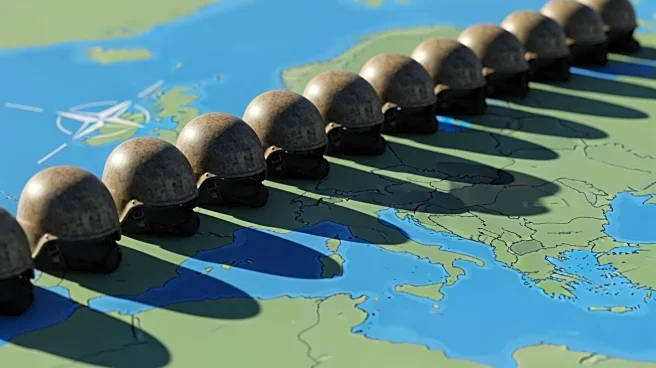What's Happening?
The United States has confirmed a reduction in its troop presence along NATO's eastern borders, particularly in Romania, amid concerns from European allies about a potential security vacuum. The decision,
announced by Romania's defense minister, aligns with a strategic shift towards the Indo-Pacific region. Despite the drawdown, the U.S. maintains that its commitment to NATO remains strong, with troop numbers still above pre-2022 levels. The move involves the 2nd Infantry Brigade Combat Team of the 101st Airborne Division returning to the U.S. without replacement. This decision comes as NATO has been enhancing its defensive posture in response to Russian aggression, with increased multinational battle groups stationed in Eastern Europe.
Why It's Important?
The reduction in U.S. troops could have significant implications for NATO's deterrence capabilities against Russian aggression. While the U.S. asserts that the move reflects increased European defense capabilities, it may also signal a shift in the burden of defense to European allies. This could lead to increased military spending and collaboration among European nations to ensure regional security. The drawdown may also embolden Russia to test NATO's resolve, potentially leading to increased tensions and incidents along the eastern flank. The decision highlights the ongoing strategic realignment of U.S. military priorities, with potential impacts on global security dynamics.
What's Next?
As the U.S. continues its strategic review, further adjustments to troop deployments may occur. European NATO allies are likely to enhance their military capabilities and increase defense spending to address any security gaps. Political leaders in Europe and the U.S. will engage in discussions to reinforce the transatlantic alliance and address security concerns. The situation will be closely monitored by NATO and Russia, with potential implications for future military and diplomatic engagements. The U.S. and NATO will need to ensure that their deterrence capabilities remain robust to prevent any escalation of tensions in the region.
Beyond the Headlines
The U.S. troop drawdown could lead to a reevaluation of NATO's defense strategy and the role of European allies in regional security. This shift may prompt discussions on the future of transatlantic relations and the balance of military responsibilities. The move also raises questions about the long-term implications for U.S. foreign policy and its commitment to global security alliances. As European nations take on more responsibility for their defense, there may be opportunities for increased collaboration and innovation in military technology and strategy.









